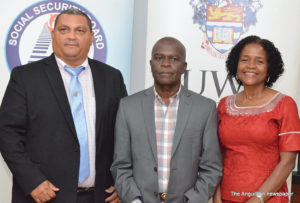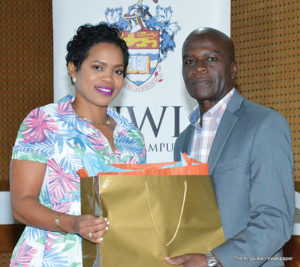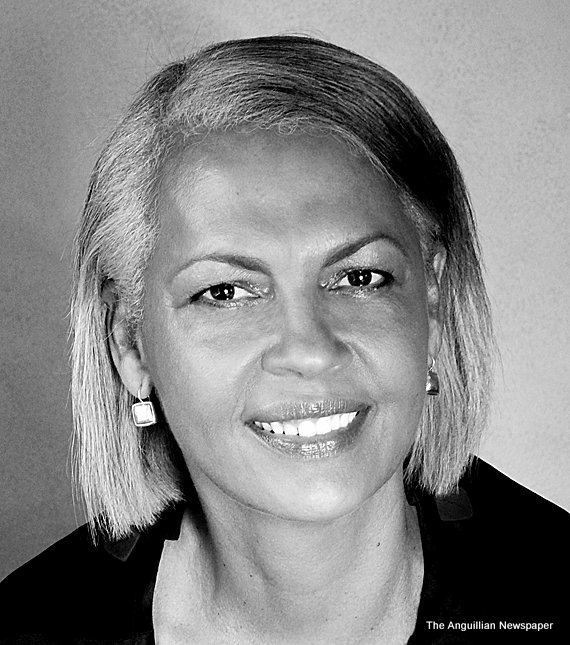
Dr. Phyllis Fleming-Banks
Resilience in terms of Hurricane Irma was the focus of the 4th Annual Lecture in celebration of Social Security Week in Anguilla on Thursday, November 1, 2018, at La Vue Conference Centre. Sponsored by the Social Security Board and the University of the West Indies Open Campus, Anguilla, the lecture was delivered by Mr. Jeremy Collymore who headed the Caribbean Disaster Emergency Management Agency (CDEMA) for more than two decades. He currently advises on disaster resilience in the office of the Vice Chancellor of the UWI at Cave Hill, Barbados.
A take away point of his lecture was “Resilience is not a reaction, but an investment” – meaning that it is not wise to wait until a disaster strikes to react to it, but to prepare for such an eventuality by investing in ways and means to deal with it when it comes. Mr. Collymore’s wide-ranging lecture covered significant disaster meteorological events, sea level rise, climate change throughout the Caribbean, the significant effects and losses sustained, and the need for governments of the region to review their social development and protection policies and to invest more in disaster mitigation.
Mr. Collymore, who stressed the need for transformative thinking in public polices, in terms of disaster management, told the considerably large gathering: “Ladies and gentlemen, I want to leave you with this message: ‘Resilience is not a reaction. It is an investment with thought and action. I invite you to think and to address this issue of resilience.”’
Director of Social Security, Mr. Timothy Hodge, who earlier delivered an interesting poem on Hurricane Irma, was the first person to respond to Mr. Collymore’s lecture during the period for questions, comments and answers. In thanking the lecturer for his presentation Mr. Hodge, a doctoral student at the University of the Virgin Islands, referred to a situation in St. Thomas and St. Croix where, following Hurricanes Irma and Maria, patients had to be moved to Puerto Rico and later to the United States mainland.
“A lot of the systems and plans referred to by Mr. Collymore were in place, but there was chaos and people did not follow the plans – so the existence of planning is one thing. What happens when everything you plan for falls down?” Mr. Hodge went on. “The plans say call this person, but the phones are not working – or go to the bank and get money, but the banks and the ATM machines are destroyed and there is no electricity anyhow. How do we get health systems, or any other system for that matter, to function under those kinds of circumstances?”

He added: “I was really proud of Anguilla because they [St. Thomas and St. Croix] had to send their dialysis patients all over the world and a lot of them came back in body bags. We continued to serve our patients here in Anguilla. We did not have to send them anywhere so kudos to the Minister and all those persons who manage our system…”
He was also proud that the Anguilla Social Security Board had undertaken to provide financial assistance for persons who were unemployed or underemployed following Hurricane Irma. Although this provision was post Irma, he nevertheless saw it as a case of forward thinking for which some type of advanced planning was in place.
Mr. David Carty, a well-known environmentalist and climate change activist, took to the podium. “I want to thank Mr. Collymore for a first class lecture,” he said. “I want to emphasize there is significant difference between resilience as we Anguillians like to brag on, and we bragged on it especially after Irma with some validity.
“I was on Back Street right here two weeks after Irma when a young man came up and, as we looked at the disaster that had befallen us, he said to me: ‘Mr. Carty, if we had had power underground, Anguilla would have taken a category 7 hurricane.’ That was funny but I understood his enthusiasm. But there is a difference between that and the resilience which Mr. Collymore has tried to emphasize.
“Recovering from a dramatic disaster, like a hurricane, is one thing. The resilience that we need going forward with climate change is a whole different game, and it is correct to point out that it is a cultural transformation that cannot be over-emphasized…”
Mr. Carty continued: “What Mr. Collymore said, in particular, that struck me was that transformative resilience recognizes that mitigating some risks requires transformational thinking. That is where we are. The reality is that climate change is now real. Look at the drought that hit Anguilla [earlier in the year]. It was perhaps the worst drought since 1938 and the figures have been skewed by that heavy rain [since then].
“The trouble with climate change, unlike Irma, is that it is insidious – it creeps on us. It changes things gradually without you even knowing and in that lies the disaster…We have to transform the way we think, using the development paradigms that we always used for the last twenty or thirty years…and act globally. We are at the mercy of a planet and political policies, particularly in the industrial and developed world, over which we have no control…”
The chairperson for the Social Security Lecture was Dr. Phyllis Fleming-Banks, Manager of the UWI Open Campuses in the British Overseas Territories in the Caribbean.
The theme of Social Security Week was: “Social Security Supporting A Culture of National Resilience.”













